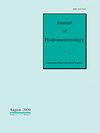Future Increases in North American Extreme Precipitation in CMIP6 downscaled with LOCA
IF 2.9
3区 地球科学
Q2 METEOROLOGY & ATMOSPHERIC SCIENCES
引用次数: 6
Abstract
A new set of CMIP6 data downscaled using the Localized Constructed Analogs (LOCA) statistical method has been produced, covering central Mexico through Southern Canada at 6 km resolution. Output from 27 CMIP6 Earth System Models is included, with up to 10 ensemble members per model and 3 SSPs (245, 370, and 585). Improvements from the previous CMIP5 downscaled data result in higher daily precipitation extremes, which have significant societal and economic implications. The improvements are accomplished by using a precipitation training data set that better represents daily extremes and by implementing an ensemble bias correction that allows a more realistic representation of extreme high daily precipitation values in models with numerous ensemble members. Over Southern Canada and the CONUS exclusive of Arizona (AZ) and New Mexico (NM), seasonal increases in daily precipitation extremes are largest in winter (~25% in SSP370). Over Mexico, AZ, and NM, seasonal increases are largest in autumn (~15%). Summer is the outlier season, with low model agreement except in New England and little changes in 5-yr return values, but substantial increases in the CONUS and Canada in the 500-yr return value. 1-in-100 yr historical daily precipitation events become substantially more frequent in the future, as often as once in 30-40 years in the southeastern U.S. and Pacific Northwest by end of century under SSP 370. Impacts of the higher precipitation extremes in the LOCA version 2 downscaled CMIP6 product relative to LOCA-downscaled CMIP5 product, even for similar anthropogenic emissions, may need to be considered by end-users.CMIP6中北美极端降水的未来增加随LOCA的减小而减小
一组新的CMIP6数据使用本地化构建类似物(LOCA)统计方法进行了缩小,覆盖墨西哥中部到加拿大南部,分辨率为6公里。包括27个CMIP6地球系统模型的输出,每个模型和3个ssp(245, 370和585)有多达10个集成成员。与以前CMIP5缩小数据相比,改进导致日极端降水增加,这具有重大的社会和经济影响。改进是通过使用降水训练数据集来实现的,该数据集更好地代表了日极端值,并通过实施集合偏差校正,允许在具有众多集合成员的模型中更真实地表示极端高日降水量值。在加拿大南部和除亚利桑那州(AZ)和新墨西哥州(NM)以外的CONUS地区,日极端降水的季节性增加在冬季最大(SSP370约为25%)。在墨西哥、亚利桑那州和NM,季节性增幅最大的是秋季(约15%)。夏季是异常季节,除新英格兰地区外,模式一致性较低,5年回归值变化不大,但CONUS和加拿大的500年回归值大幅增加。在SSP 370的影响下,历史上百年一遇的日降水事件在未来将变得更加频繁,到本世纪末,美国东南部和太平洋西北部每30-40年发生一次。对于类似的人为排放,最终用户可能需要考虑LOCA版本2缩小版CMIP6产品相对于LOCA缩小版cmipp5产品中较高极端降水的影响。
本文章由计算机程序翻译,如有差异,请以英文原文为准。
求助全文
约1分钟内获得全文
求助全文
来源期刊

Journal of Hydrometeorology
地学-气象与大气科学
CiteScore
7.40
自引率
5.30%
发文量
116
审稿时长
4-8 weeks
期刊介绍:
The Journal of Hydrometeorology (JHM) (ISSN: 1525-755X; eISSN: 1525-7541) publishes research on modeling, observing, and forecasting processes related to fluxes and storage of water and energy, including interactions with the boundary layer and lower atmosphere, and processes related to precipitation, radiation, and other meteorological inputs.
 求助内容:
求助内容: 应助结果提醒方式:
应助结果提醒方式:


